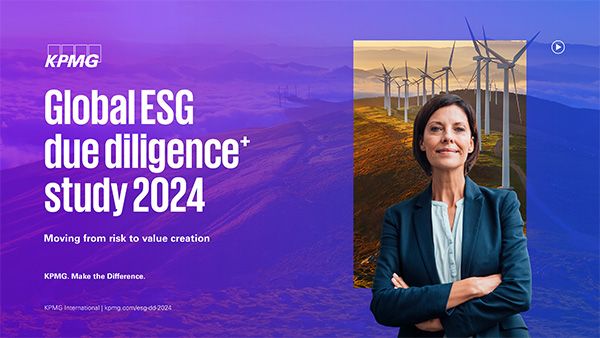
ESG due diligence rising in priority
ESG due diligence remains a priority for dealmakers. In fact, respondents to the latest Global KPMG due diligence study report a rise in ESG priority in transactions over the last 12 to 18 months, despite challenges.
Many global M&A markets have decelerated in the face of higher interest rates. Geopolitical and economic uncertainty has taken its toll, shifting priorities for many businesses. And, in some countries, there is lively public debate about the merits and justifications to include ESG factors in investment decisions.
Despite these headwinds, the findings from our latest survey of more than 600 active dealmakers from 35 geographies confirms the results of the first-ever international study on ESG due diligence. In 2022, we set out to explore ESG sentiments among dealmakers across the Europe, Middle East and Africa (EMA) region. A follow-up study in the US in 2023 found similar developments, albeit slight less pronounced than in the EMEA region.
Global insights at a glance
ESG due diligence continues to rise in importance, despite headwinds.
Dealmakers report an increased importance of ESG due diligence over the past 12 to 18 months, and expect further increases soon.
This counters initial expectations of a decline in the importance of ESG factors due to softer M&A activity, economic uncertainty and an ESG backlash in some countries.
Leading investors tie ESG to the investment thesis and drive financial value from it.
They do this by combining a deep understanding of the commercial, operational, and financial risks and opportunities triggered by evolving ESG regulations and stakeholder expectations with a disciplined focus on financial returns during the holding period. They use tools like comprehensive baselining, integrated 100- day action plans, and a systemic scan for sources of financing to improve their investee’s performance. Such performance improvements can materialize in the form of increasing revenues, decreasing costs, or de-risking of an investment, across various environmental and social and governance areas — at this moment, typically in connection with themes such as decarbonization, recycling and circularity and supply chain management.
Challenges in conducting ESG due diligence persist, but solutions are emerging.
Investors struggle with selecting a meaningful, yet actionable scope with receiving quality data from target companies, and with quantifying potential findings. However, for each of these challenges, there are emerging solutions. On scoping, it is becoming increasingly clear which topics should indeed be part of an ESG due diligence workstream, with the focus moving from values to value. On data quality, we see a great opportunity for sellers and sell-side advisors to drive value from divestments by commissioning higher-quality ESG vendor documentation. And on quantification, the synergies between ESG due diligence teams and commercial and operational due diligence teams are becoming clearer.
Key findings

1. The monetary value of identifying ESG risks and opportunities early (58% of respondents agree)
2. The ability to better respond to regulatory requirements (44% of respondents agree)



Interactive dashboard
Discover the data that drives the world of ESG due diligence with our interactive dashboard. Designed to offer a more personalized view of the data points detailed in our report, this tool allows you to delve deeper into the survey results. With the ability to filter data by region, company type, and sectors, you can gain additional perspectives and insights that go beyond the report.
This dashboard is a companion to the Global ESG due diligence study and when used together, they provide a comprehensive understanding of the findings. Download the report and explore the dashboard today. Unlock the power of data to drive your ESG due diligence decision-making process.
ESG due diligence around the globe
Click on the country or region below for the unique point of view in each market.
ESG due diligence in Australia
In Australia, decarbonization, climate risk – both physical and transition – dominate the ESG conversation. With no required ESG regulations in place just yet, companies keenly aware of the financial implications of ESG are voluntarily reporting on their ESG practices and disclosing standards.
Investors, too, are increasingly aware of the importance of identifying climate risks and mitigating climate exposures. Modern slavery, human rights and labor practices are also growing focus areas as dealmakers look to better assess potential reputational risks associated with non-compliance.
Yet, it is the opportunities for value creation that has captured the imagination of mature dealmakers. Reinforced by intensifying progressive sentiments, dealmakers are assessing potential targets with a lens on how well they can navigate the transition to a low-carbon economy.
Those with such potential, can innovate using Australia’s natural advantages, its abundant sunshine, for example, to enhance competitiveness in the renewable energy sector, and access new revenue streams and markets. Products with strong ESG credentials can also command premium prices.
Seeking value, not values
The appetite for ESG due diligence is rising, yet the breadth and complexity of the topics within the ESG umbrella is challenging. Unlike financial due diligence, which has a well-defined scope, ESG due diligence encompasses a wide range of issues that can make it difficult for investors to know which issues to prioritize and manage. Adding to this is the lack of prescriptive regulations, like those in the EU, that are making it tough for businesses to navigate socially sensitive situations.
Dealmakers also struggle with the practical aspects of integrating ESG considerations into their dealmaking. This includes defining and measuring the financial impact of ESG performance. As finding the right advisors who can offer a holistic approach that encompasses environmental, social and governance factors with sector knowledge and an investor acumen.
KPMG professionals help clients focus on value, not values. Driven by the financial value that ESG due diligence can bring to an investment, teams bring their extensive experience and global methodologies to quickly and efficiently define a scope of work that targets value creation, which is translated into financial language.
As the country prepares to implement new ESG-related reporting frameworks, starting with climate disclosures in 2025, ESG due diligence awareness and adoption is expected to grow across all market segments.
Visit our website if you want to know more about ESG due diligence in Australia www.kpmg.au
ESG due diligence in Canada
Canada continues to strengthen its understanding and implementation of corporate ESG risk mitigation . In the early days of the responsible investing movement, the country’s larger public pension funds were among the first to recognize the impact ESG could have on enhancing revenue, reducing costs and mitigating risks. Many of Canada’s banks , corporations and investors quickly followed suit, voluntarily aligning with international sustainability standards like the Principles for Responsible Investment (PRI) and the Task Force on Climate-Related Financial Disclosures (TCFD).
As mandatory measures begin to emerge, including reporting on climate risk management for banks, the fight against forced and child labor in supply chains across all sectors, and federal and provincial carbon pricing mechanisms, the country will see even more transparency across ESG considerations. This proactive approach is leading many investors and businesses to view ESG due diligence as an effective tool for identifying opportunities for value creation rather than solely as a way to mitigate risks.
Opportunities abound in ESG
The energy transition, for example, offers ample investment opportunities in renewable energy, electric vehicles and battery storage. Government incentives at various levels further support these initiatives, offering financial benefits for energy efficiency and retraining programs. On the risk side, the country’s exposure to wildfires and extreme heat events call for robust climate risk management strategies, especially for the transportation and logistics , mining and industrial manufacturing sectors.
Despite this support for ESG due diligence, investors are challenged by the limited access to reliable data, especially when targets may not provide comprehensive information. Canada’s diverse investment portfolio spans various global markets, making it difficult to maintain consistent and comparable ESG information. In particular, smaller investors struggle with limited resources and expertise compared to larger funds.
To help navigate these challenges, KPMG in Canada uses its subject matter expertise in various sectors and sustainability issues to provide clients with insights and practical tools. The firm’s global reach and access to a diverse client base support clients with leading trends and practices to help dealmakers connect ESG findings to revenue growth, cost management and asset valuation.
Looking ahead, climate change is expected to demand increased attention in terms of physical and transition risks. The social aspects of ESG, including talent attraction and retention, is also gaining prominence. Sustainability will increasingly influence valuations – all of which will likely make ESG due diligence an essential part of investment decision-making.
As ESG in Canada evolves from a voluntary, business-led initiative to a more structured practice, investors will need to stay agile and seek the professional guidance they’ll need to help turn ESG challenges into opportunities for sustainable growth and long-term value creation.
Visit our website if you want to know more about ESG due diligence in Canada www.kpmg.ca
ESG due diligence in China
Over the past two decades, ESG due diligence has undergone a significant evolution in China. Initially, ESG disclosures were influenced by foreign investors – global private equity funds investing in China as well as Chinese investors participating in outbound opportunities. Today, voluntary ESG reporting is growing across the country.
China’s ambitious carbon targets has supported this uptake. ESG standards have been embedded into broader compliance frameworks, such as energy efficiency review, air emissions, water discharge and industrial zoning. These regulations promote sustainable development and meet global standards. For the most part they heavily emphasize environmental concerns, and as such, predominately affect high-risk sectors, such as manufacturing and energy.
With the potential to incur operational risks, loss of investor confidence as well as financial penalties, investors have come to see ESG due diligence as a compliance exercise.
Broadening the scope of ESG due diligence
As more and more investors and companies recognize the value of ESG, This perception is starting to change. Investors and consumers are calling for private equity businesses to prioritize environmental and social responsibilities. Government regulations are following suit. Guidelines are being developed to promote corporate social responsibilities, and environmental regulations are expanding to more industries.
Geopolitical uncertainties are becoming more complex, requiring investors to carefully consider these factors in their investment decisions. There are also opportunities for local and global investors: aligning to best practices boosts a company’s public image at home and enhances its appeal globally. The latter point is of particular interest for those investing in emerging sectors, including renewable energy and electric vehicles.
All together, these factors are helping corporate and private equity investors broaden their scope of ESG. As more and more investors perform ESG due diligence and use its findings as a strategic tool to create value, they will likely call on businesses to collect reliable ESG data to better assess ESG performance – such data is currently lacking. Investors should also look to their advisors for such strategic insights, in addition to providing in-depth analysis of regulatory compliance. In time, it is anticipated this experience will help investors in China embrace ESG as a core aspect of their business strategy.
Visit our website if you want to know more about ESG due diligence in China www.kpmg.cn
ESG due diligence in Finland
The trend in Finland is clear: corporate and private equity investors recognize ESG as a value driver to enhance portfolio performance. ESG due diligence is gaining traction, too, appearing in about 20 percent of all deals.
This movement is greatly influenced by the ESG regulation landscape in the EU. Like other EU countries, Finland adheres to the Corporate Sustainability Reporting Directive and directives in place in the EU.
This proactive approach goes further. Mature investors, particularly private equity houses, have integrated ESG considerations deeply into their strategies and operations. Portfolio managers, for example, have developed internal capabilities and tools to scout targets that are innovating sustainable solutions, such as smart grid technology, or using circular economy practices to minimize waste and maximize resources.
From an early stage of the deal, they assess ESG factors to guide investment decisions and help ensure that potential acquisitions align to their sustainability goals. Additionally, they leverage ESG performance to attract capital, structuring financial arrangements where ESG key performance indicators, such as diversity and climate targets, can influence capital costs.
Finland’s institutional investors, including pension funds and insurance companies, are highly sophisticated with comprehensive responsible investment policies. Using ESG strategies, including exclusionary screening, thematic investing, active engagement and ESG integration, they can better position their investments to generate financial returns while positively contributing to social and environmental outcomes.
Investors with less sophisticated practices also increasingly recognize the potential for value creation from strong ESG performance. Yet, there are challenges holding them back from capturing these opportunities through ESG due diligence. With a focus on the immediate risks, some investors struggle to recognize long-term value. Further, quantifying value of ESG factors, such as human rights and diversity in management, requires sector-specific insights and nuanced analysis that goes beyond simple compliance checks.
Adding to this challenge are budget constraints. This common issue often leave investors depending on other due diligence workstreams to surface ESG risks, or limiting the depth of analysis within a specific ESG due diligence.
As regulations continue to evolve and investor expectations rise, companies should deepen their ESG integration. Time will also help investors mature around ESG assessments. As they do, pooling sector and ESG due diligence expertise can position them to become a benchmark for others to follow.
Visit our website if you want to know more about ESG due diligence in Finland www.kpmg.fi
ESG due diligence in France
Investors in France consider ESG issues like talent retention, social governance and environmental initiatives as integral to a company’s long-term success. This has led to marked shift in the demand and scope for ESG due diligence in the past 10 years.
For decades, businesses and investors in France were focused on environmental, health and safety factors related to tangible assets like manufacturing facilities. Then with the growing number of French signatories to the UN Principles of Responsible Investment since 2012, the scope was expanded to include the fuller ESG criteria. This sentiment led to growing demand for ESG due diligence. A trend that is helping investors mitigate the environmental, social and governance risks that face many French companies. For example, environmental risks in industries with high environmental footprints or high turnover rates and employee dissatisfaction that can impact business continuity and reputation.
On the other hand, ESG due diligence is helping mature investors uncover numerous advantages. Companies that aligned with decarbonization targets or demonstrate strong ethical supply chain practices often have enhanced reputation capital, which can translate into higher customer loyalty, better employee retention and greater overall market value. Sellers, too, win, attracting more investments in their business.
Despite this growing awareness and appreciation, ESG due diligence continues to be seen as a ‘nice to have’ exercise by less mature investors who are unsure which components to assess across the broad scope of ESG criteria. These dealmakers often allocate lower budgets to ESG due diligence compared to other due diligence streams, making it hard for advisors to provide an effective assessment of the risks and value potential of a deal.
In time, as regulatory frameworks evolve and investors become more attuned to the potential business benefits of ESG, the demand for ESG due diligence will continue to gain momentum. Expectations will likely also shift toward more comprehensive and higher-value ESG assessments that can open the door to better business outcomes and a more sustainable future.
Visit our website if you want to know more about ESG due diligence in France www.kpmg.fr
ESG due diligence in Germany
The following is the transcript from an interview with Elsa Stetinger, KPMG in Germany, about the evolution of ESG due diligence in Germany.
At a high level, could you please explain the local regulatory framework that supports ESG due diligence?
In recent years, various regulations have been enacted, such as the EU Green Deal, EU Taxonomy, SFDR, TCFD, TNFD, CSRD, CSDDD, German Supply Chain Act, CBAM and the Anti-Greenwashing Directive that was recently in 2024 enforced. These have become much more important, especially in the European Union. Those regulations are also strongly interlinked and relevant nowadays to conduct and support an ESG due diligence because those regulations request (i) transparency (ii) comparability and (iii) reporting. This, along with the identification of risks and opportunities, is the core of an ESG due diligence. These regulations are a strong signal from politicians and the countries for the need for sustainable investments and transformation that drive the future market outlook and future transactions including ESG due diligences on the buy-side and on the sell-side.
What are the key ESG risks and opportunities that companies in Germany face?
The key ESG risks in Germany include:
framework to analyze risks and opportunities.
At the same time, the various regulations are a great steep template and offer a huge chance for:
Could you provide some examples of how ESG factors have influenced investment decisions and/or deal outcomes?
There are several environmental topics, such as very high emissions, main energy sources from nuclear power plants or brown coal, and severe soil and groundwater contamination that could impact the outcome of a deal. Social topics, such as human rights issues, forced or child labor as well as poor working conditions, including severe accidents and deaths within a company are an absolute deal breaker. And of course, there are various other ESG factors, such as water scarcity or poor climate mitigation, and climate adaptation measures that can influence the investment decision and the deal price.
What are the common challenges that companies face when implementing ESG due diligence in your local market?
Some common challenges include:
How does your firm help clients navigate ESG risks and opportunities?
At KPMG in Germany, we have established a robust and at the same time flexible, ESG due diligence framework that assess the ESG-performance and status quo of a company or investment. Our ESG due diligence framework is based on the various regulations (as mentioned before) and combines and integrates the anchored environmental, social and governance requirements. Additionally, we include other KPIs that are appliable to the industry, sector and business activity. Our established robust and flexible ESG due diligence framework allows us to reveal the material risks and opportunities based on key element and color-coding system. It creates objectivity, transparency, comparability and implies the relevant building blocks as a great basis for future transformation processes and impacts of a company or investment.
What trends or developments do you foresee in next 5-10 years?
I think ESG due diligence (as a stand-alone workstream) will a be involved almost in 100% of all deals. The need is and will become very high for transparency and a real sustainable future – away from greenwashing. I think the ESG due diligence scope is constantly expanding, and more building blocks will be integrated in the ESG due diligence scope as newer and stricter regulations will become enforced. The expansion will include integrity due diligences, a stronger double and even triple materiality assessments, and of course risks and opportunities. There will be more precise benchmarking with better data quality, and customer and stakeholder analysis. I believe that various companies might not be able to exist on the market in the next five to 10 years if they do not undertake a sustainable transformation. At the same time, I believe that ESG high-performing, very innovative and sustainable companies with a smart governance structure with high-qualitative and robust data will conquer the market in the next five to 10 years.
Visit our website if you want to know more about ESG due diligence in Germany www.kpmg.de
ESG due diligence in Iceland
A growing number of investors in Iceland are aligning their investments to sustainability objectives. The upward trend comes from the country’s rising commitment to environmental sustainability, global climate action initiatives, and gender equality and other social issues.
As a result, ESG due diligence is evolving in the country. Five years ago, ESG considerations were rarely part of a deal’s due diligence process. Now, there is a promising evolution in a short period of time where investors are asking ESG-related questions during traditional due diligence exercises, such as tax and legal. More mature investors are also leveraging ESG due diligence to assess the value creation potentials in a target.
In a country ripe for sustainable innovation, investors are looking for businesses that have the potential to advance renewable energy options like geothermal or hydroelectric power. Iceland is also well-known for its strong stance on gender equality and other social equities. This social consciousness is having a greater influence on investors as they seek out targets that actively promote equal opportunities and representation across all levels.
Compliance as a first step
With financial bodies calling for updated reporting from companies big and small, the race to implement the new regulations has left many companies scrambling. Partly this is due to a cultural tendency to comply with regulations only when enforced. However, good progress has been made. Larger companies with their better access to systems and expertise have been more efficiently responding to mandates. Smaller businesses, which make up the majority of Iceland’s economy, have also been working to understand the technical standards and minimum safeguards required to comply, despite their limited access to expert resources.
As Icelandic companies adapt to these changes, the role of due diligence will become increasingly intertwined with ESG factors. A thorough understanding of ESG issues will be essential for due diligence teams to assess the fuller spectrum of compliance and sustainability aspects. Companies will also need to continue to develop their ESG practices to mitigate associated risks and fully capitalize on the sustainability opportunities ahead.
Visit our website if you want to know more about ESG due diligence in Iceland www.kpmg.is
ESG due diligence in Island Group
In jurisdictions known for their susceptibility to significant climate risks, ESG due diligence is gaining attention. The many islands within the Caribbean, together with Jersey, Guernsey, the Isle of Man and Malta make up the KPMG Islands Group, where investors and businesses are beginning to recognize the potential of ESG to attract global capital and ensure sustainable growth.
In the Cayman Islands and Bermuda, the financial services sector shows a growing awareness of ESG considerations. In the more traditional industrial and tourism-centric jurisdictions, such as Trinidad & Tobago and Jamaica, there is also a growing understanding for ESG and its importance to long-term sustainability and competitiveness. With the potential for substantial financial returns, more mature regional players and impact investors are beginning to integrate ESG factors into their investment strategies.
Progress, however, is slow due to the absence of mandatory regulations as well as global political influence. For now, ESG integration relies heavily on voluntary adoption and the foresight of investors and business leaders who are looking to open up new opportunities for growth and development.
As governments in the region begin to implement frameworks to support sustainable finance, businesses will likely begin to embed ESG principles into their core operations and investors are more likely to incorporate ESG due diligence into their decision-making, along with the more traditional financial, commercial, regulatory and tax due diligence. This shift could come faster as governments contend with the realities of climate exposure. Hurricanes, rising sea levels and extreme weather events pose significant threats to these islands. The Bahamas, for example, is still recovering from Hurricane Dorian in 2019 and may be at risk of financial default if another hurricane strikes.
An eye focused on innovation
On the upside, with plenty of sunshine and wind energy (as well as the increasingly talked-about natural resource, sea grass), the Caribbean region is teaming with untapped ESG potential into renewable energy sources like solar and wind power and the ability to create a carbon credit economy from sea grass, as is being explored in The Bahamas. Such innovations can be hindered by high costs and legacy agreements, but declining costs of renewable technologies and innovative financial strategies, such as thematic bonds, could unlock substantial growth in this sector. Governments and private investors can also come together on large-scale renewable energy projects that could help reduce reliance on imported fossil fuels, but also create sustainable jobs and stimulate economic growth.
The KPMG Islands Group professionals are helping investors understand the long-term value that comes from sustainable practices and unlock the region’s potential for sustainable growth. As more investors take advantage of these opportunities, KPMG professional will help them integrate ESG due diligence to identify potential risks and uncover opportunities for value generation.
Visit our website if you want to know more about ESG due diligence in Island Group https://kpmg.com/ky
ESG due diligence in Norway
ESG is moving up the business agenda in Norway . Already many businesses and investors comply with ESG reporting. This signals the country’s cultural commitment to sustainability and the environment. Businesses also feel a sense of national pride and responsibility to uphold Norway’s image as a responsible and ethical nation.
Even more businesses are expected to adhere to reporting in line with EU and national standards and requirements as they begin to roll out, including the Corporate Sustainability Reporting Directive (CSRD) and the Corporate Sustainability Due Diligence Directive (CS3D). At the core of Norway’s new regulations is the Transparency Act, requiring companies to identify and assess actual and potential adverse impacts on human rights and decent working conditions in companies and their supply chains, among other requirements.
As welcome as these regulations may be, they are creating new challenges for companies. Businesses often struggle with understanding the depth of compliance required by new and evolving regulations. Lack of reliable data and information adds another layer of difficulty.
For example, Norway’s energy businesses often have complex, multi-tiered supply chains that deal with suppliers from countries and regions with lower transparency practices and potential human rights violations. Without a clear line of sight, companies can be exposed to reputational risks and public disapproval.
Such risks can extend to investors, putting greater importance on comprehensive ESG due diligence developed by ESG specialists that stay on top of evolving regulations and understand the geopolitical risk environment within specific sectors.
Sustainable opportunities encourage evolution
As important as it is to mitigate risks associated with these social factors, investors and businesses are looking across the broader scope of ESG to identify potential opportunities to create value for their companies. This is most notable in the country’s growing clean tech and renewable energy sectors with decarbonization innovations like electrolyzers for hydrogen production and expanding hydropower and wind energy sources.
As these and other technologies evolve, there may be growing focus on the intersection of tech investments and ESG considerations. For example, as more businesses leverage AI they may want to consider how to best power their respective data centers with sustainability in mind. Such evolutions will also shift and refine the scope of ESG due diligence to help investors maintain their sustainable and ethical commitments, while enhancing their portfolio performance.
Visit our website if you want to know more about ESG due diligence in Norway www.kpmg.no
ESG due diligence in Spain
In Spain, investors have come to see ESG due diligence as an essential part of value creation in transactions. This shift indicates a growing sophistication among corporate and private equity dealmakers, and a recognition of the strategic potential benefits of robust ESG credentials.
Spain’s ESG due diligence practices are heavily influenced by the influx of EU regulations over the last several years. These directives compel funds to integrate ESG considerations into their operations. This exposes businesses and investors to risks should they neglect to comply to these mandates. For example, in sectors like energy or agriculture, lack of alignment could lead to unforeseen liabilities and reputational damage.
Regulations aside, evolving consumer demands influenced corporate and private equity investors to practice greater corporate responsibility and transparency also contributed to the shift. As investors began integrating ESG factors into their investment decisions, the experience provided proof that prioritizing ESG supported long-term financial performance. It also enhanced their reputation and helped build trust with clients, consumers and other stakeholders.
ESG-focused companies are often less volatile, and demonstrate superior risk management and operational efficiency. They are also more innovative. Such innovation could come in terms of how well a target can adapt to future regulatory changes or evolving market conditions. It also offers insights in a company’s potential to branch out to emerging sectors, such as renewable energy, sustainable agriculture or green technology – all of which are poised for substantial growth in Spain.
For the most part, ESG in Spain has mainly centered on environmental aspects. Addressing issues like climate change and decarbonization impacts a company’s operations, portfolio of products and services, as well as its overall strategic approach. The social and governance aspects of ESG are less tangible. Yet, mature investors are increasingly recognizing such issues, like human rights and fair labor conditions, can be integral to building resilient companies.
Quantifying such factors is one of the challenges dealmakers face during the due diligence process. Unlike environmental liabilities that can often be translated into financial terms, social and governance issues can be tough to attach to a concreate number. Such complex valuations call for ESG specialists who can assess the cost of reputational risks on company value.
Looking ahead, ESG due diligence in Spain is expected to continue to evolve from a niche practice and become a mainstream necessity. This will be especially important as regulations progress and adjust, and consumer demands shift to new focus areas.
Visit our website if you want to know more about ESG due diligence in Spain www.kpmg.es
ESG due diligence in U.K.
Investors in the UK are increasingly focusing on sustainability and ESG considerations in their investment process. As a result, ESG due diligence has jumped higher up the M&A agenda. The KPMG 2024 Global ESG due diligence study found 71 percent of respondents reported an increase in importance of ESG in transactions over the last 12 to 18 months.
There are several drivers underpinning this shift. ESG has become an important lever to create value in transactions and dealmakers are seeing higher returns for their investments when there are stronger ESG practices and positioning in place. Investors are also focused on protecting value. With increased regulations, such as the EU Corporate Sustainability Reporting Directive (CSRD), and concern for ethical considerations there are potential reputational risks that could come with non-compliance.
There has also been a significant increase in impact investing. Investors focused on impact seek companies that balance profit with purpose, and are focused on addressing global sustainability challenges, such as the energy transition.
For investors, then, failure to embrace ESG can leave tangible value on the table. It can also minimize the pool of capital, and potentially prevent a deal from closing. UK investors are turning away from some sectors, such as tobacco, gambling and fossil fuels due to ethical consideration and long-term sustainability concerns. According to the survey, more than 50 percent of surveyed investors indicated that ESG was a “deal stopper.”
Investors are also asking more of target companies. With ESG due diligence becoming a strategic, cross-function and commercially focused exercise, investors are looking for greater transparency on their climate-related practices, diversity, equity and inclusion programs, supply chains and more.
This is pressuring sellers to enhance ESG-related efforts, especially as more dealmakers plan to include ESG due diligence in deal strategies going forward. Globally, 57 percent of survey respondents say they expect to perform ESG due diligence on most of their transactions over the next two years.
Even with this rise in activity, investors are looking for greater clarity around the areas to evaluate, specifically in fast-moving deal contexts. Whereas others are looking to advisors to help quantify less tangible ESG factors, such as the impact of reputation risks or long-term environmental impacts on value. KPMG in the UK’s ESG Transaction Advisory services is placed to help, bringing you the experience and insights you need to realize value from ESG in your investments.
Visit our website if you want to know more about ESG due diligence in U.K. www.kpmg.uk
ESG due diligence in U.S.
ESG is undergoing a transformative shift in the US. With regulations tightening, the investor community is beginning to recognize the link between sustainable ESG practices and sustainable business growth.
ESG has long been on the agendas of US investors and businesses. Federal and state regulations were initially focused on environmental health and safety matters, ensuring businesses had the right permits for sustainable practices like air emissions, wastewater discharge and waste management. Many of these requirements are still in place today.
States have also introduced ESG-related regulations to encompass a wider range of issues, including sustainability, employee well-being and regulatory compliance. More recently, states like California have implemented climate disclosure requirements for businesses.
Investor influence spurs ESG due diligence
Yet, the biggest push for ESG mandates comes from investors themselves. Over the past five to eight years, there has been a marked shift in interest around ESG from investors. This has been particularly driven by private equity investors who are focused on creating sustainable and long-term value for their businesses. They are funding innovative projects in renewable energy and carbon capture and energy-efficient technologies. They are also turning to their advisors to discuss governance matters, supply chain transparency, product lifecycle and customer satisfaction.
Growing demands from socially and environmentally conscious consumers are further pressuring US companies to integrate ESG considerations into their business strategy and operations. However, reporting these practices to investors during ESG due diligence is proving challenging.
One major issue is the collection and management of relevant data, particularly for greenhouse gas inventories. Many companies can track their direct emissions, capturing indirect emissions from supply chains is complex and resource intensive. Governance is another area of concern. Not all companies have access to robust mechanisms to report regulatory reporting and materiality assessments, or reliable data on social matters related to business ethics, labor practices or supply chain integrity.
Despite these initial challenges, investors and businesses are starting to realize the financial and operational benefits of more sustainable and ethically responsible practices and investments. Looking ahead, emerging regulations and increasing stakeholder demands is expected to continue to shape the ESG landscape in the US. As this happens, investors will need to stay agile and seek expert guidance to unlock new growth opportunities.
Visit our website if you want to know more about ESG due diligence in U.S. www.kpmg.us
How KPMG can help
KPMG firms’ global ESG due diligence methodology
Since the launch of the landmark KPMG ESG due diligence study in the EMEA region in 2022, the state of adoption and prevailing challenges faced by investors have been clear. In response, KPMG ESG due diligence solution leaders worldwide have developed a market-leading, client-informed ESG due diligence methodology that quantifies ESG risks and value creation opportunities, calibrating them against investment materiality. It combines the experiences of the leading practitioners across the global KPMG organization, making them accessible and consistent to our teams globally. The KPMG methodology leverages internationally recognized ESG standards and frameworks, as well as industry specific regulations. It is scalable, enabling tailored scoping for respective targets and sectors, and covers a wide array of ESG topics with input from various subject matter specialists across the global KPMG organization. The methodology is also tech-enabled, drawing on vast public and proprietary ESG benchmarks and data sources globally. Importantly, ESG due diligence findings are calibrated with financial materiality and value drivers, articulated in terms of their strategic business and deal implications.
Contact us
KPMG member firms are at the nexus of the intersection between M&A and ESG. Through their daily work, KPMG professionals are at the forefront of the developments taking place in this rapidly evolving field. They are working with many of the leading corporate and financial investors to identify and develop ESG-related deal strategies and processes that meet their unique needs and objectives.














